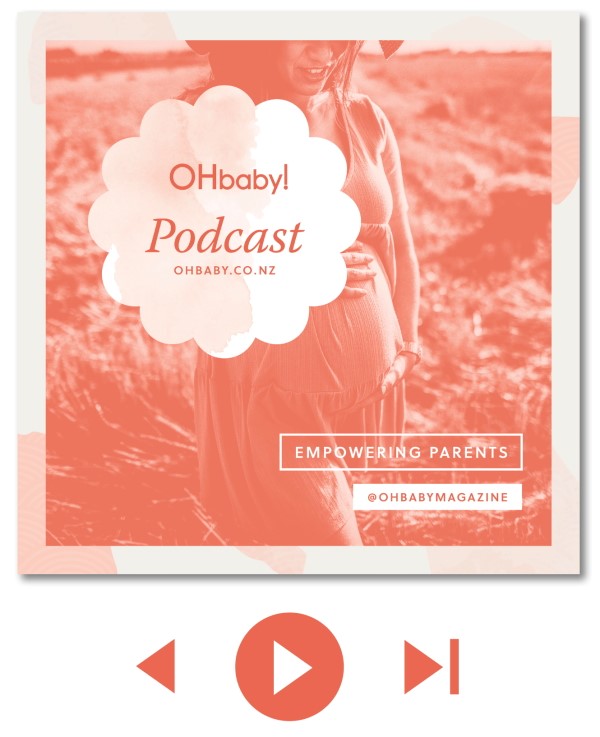We chat to Baby Whisperer about newborn sleep & feeding

OHbaby! Editor, Kristina Rapley interviews Karitane Mothercraft Nurse, baby whisperer to the stars, and author, Dorothy Waide. Dorothy has over three decades of experience working with babies and parents and has been involved with OHbaby! for 11 years. She’s now a consultant and speaks at workshops, events, and childcare centres.
Newborns
Dorothy talks about the first three months of a baby’s life being the ‘fourth trimester’. “Baby’s been in your womb for nine months, so it’s been nice and cocooned and then it pops out into this world and everyone’s got to get used to the baby being outside of the womb… I very much believe in the fourth trimester. I really want to get that philosophy out there that you simply can’t spoil a newborn baby” says Dorothy. She emphasises that it’s okay to just sit and hold your baby and to be wholly baby oriented. “That’s part of being a mum, especially in those first 6 weeks, you’ve birthed a baby, your partner and yourself have got used to having this third person in the house… You’ve got to take that time, and just by holding and being there for your baby that’s where you get to understand each other.”
Although we are bombarded with marketing campaigns that tell us all the things we ‘need’ when we have a baby, Dorothy believes in keeping it simple. “There’s just so much stuff out there that’s really superficial, we’ve really got to start getting back to basics.”
Sleep and Settling
As all new parents know, sleep and settling can be two of the biggest challenges when it comes to newborns. Dorothy’s advice is: “Number one, try not to do anything in arms that can’t be replicated in a cot – that’s crucial. Number two, babies don’t have the tools onboard to self-soothe or resettling until 12-16 weeks, you need to show them.” Dorothy’s method of settling involves holding baby in an engulfed position in your arms, keeping your body still, and doing movement on the baby, this could be patting their chest for example. “It’s also important that when we’re teaching a baby to self settle and resettle, which leads to sleeping, that we consider two main factors: food and sleep. If they eat well they sleep well, and if they sleep well they eat well. Now, in saying that if you’ve got a medical problem with your baby they may feed well but they’re not going to sleep well.”
In terms of crying, Dorothy says that crying is normal: “It’s natural for a baby to cry, we actually want our babies to talk to us but we don’t want them to cry for long periods of time, and we don’t want them crying in pain. We need to listen to our babies and understand that crying is part of communication. So when you’re going to put a baby to bed, yes they are going to cry, but I always say you can leave them to cry for a minute for every week they are but never exceed five minutes. If I’ve got a newborn baby and I put them in the cot, I’m going to do what I call ‘dump and run’, don’t hover like a helicopter! I put my baby in and step right back, I could lie on the bed that’s in the room, or on the floor, I could come back in and put one hand on their chest and one hand on their lower torso… But I’m going to listen to my baby, and that’s what’s important. Now if it’s an appropriate noise, then you can leave them. If it’s an inappropriate noise, you’re going to intervene because they do not know how to fall asleep. Whatever you do in those 12-16 weeks is what your baby is going to take on as their tools” she says.
One tip Dorothy suggests when settling your baby is standing. “As a parent, you feel more comfortable, and the baby feels more comfortable when you stand. There’s lots of theories about that, to me the basic theory is that when you stand and start walking you’re doing something that is easy to do, so inwardly you start relaxing and your baby starts relaxing. But if you take that theory, but sit your body down and engulf them and keep their body still and do that walking movement which is cupping, on their body, or the rocking movement on their body, you’re actually giving them the same thing… you can actually sit and do that with your baby in comfort”.
In terms of resettling, this is something that Dorothy says is the hardest thing to teach a baby. “For resettling overnight, I would pick the baby up and safely bedshare with them. It’s easier to lie down with the baby in bed with you than to be hanging over a cot or bassinet trying to calm them down. Resettling overnight is not about not feeding, it's ensuring they’re feeding for hunger not for comfort. Babies are meant to wake up overnight, especially newborns and especially as they grow. Sometimes babies just need reassurance. We’ve gotta start nurturing our parents as well as our babies. We’ve gotta make sure parents are getting sleep, you shouldn’t have to be sleep deprived for the first five years” she says.
In those first three months it’s not so much about expecting your baby to be able to self-soothe or resettle on their own, it’s just about taking little steps to make that transition easier when they are developmentally ready. “If you’ve got a baby that doesn’t settle and is screaming and inconsolable, listen to your baby, they’re telling you something. Either you’re eating something (if you’re breastfeeding) that can be affecting the baby’s gut, if you’re formula feeding maybe the formula isn't the right one for your baby, there could be a medical problem, it could be reflux, it could be colic, it could be a number of things, it could be a small medical thing, or it could be a major thing, the only way to work it all out is to look at the source of that food and look at their latching on, and go from there. However, if they’re inconsolable, you need to get some help” says Dorothy.
Feeding
So what are the basics of feeding in those first three months? Dorothy says, “If you’re breastfeeding your baby, you need to know how to do a deep latch on. Ensure when you’re latching on that your first finger is nowhere near your areola. Otherwise when the baby comes in they will hit that finger and will do a shallow latch. If you’re breastfeeding and you’ve got cracked nipples, or your babies making a clicking sound when they’re feeding, then you need to get someone to look at your baby’s tongue. Tongue tie can affect feeding, introduction to solids, and speech. You can go to a tongue tie specialist if you think your baby has a tongue tie. If you have a breastfeeding issue, it’s usually one of a few things: either what the mum's eating, the mechanics of the baby’s mouth, or the latch. If it’s bottle feeding, it’s how you bottle feed: bottle-fed babies ideally should be held in that same stretched out position as a breastfeeding baby. If you’re struggling with reflux or colic, I always recommend removing egg, dairy, and soy for 72 hours, it’s the quickest and fastest way to tell if one of these foods is the cause. You’ve got to have support around you if you’re having issues with feeding” shares Dorothy.
OHbaby! magazine brings you the OHbaby! Empowered Parents Podcast.
 |
|








